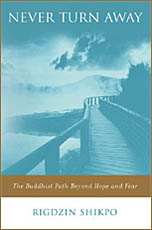Rigdzin Shikpo studied with several renowned Tibetan Buddhist teachers including Chogyam Trungpa and Dilgo Khyentse Rinpoche. Today he is the Dharma Director of the Longchen Foundation, a community of Buddhist teachers and students practicing meditation in the Dzogchen tradition of Tibetan Buddhism. The title of this collection of talks given in England and Germany is taken from Chogyam Trungpa who said that we should always turn toward things and especially those things that scare us. This tradition salutes the practices of openness, clarity, and sensitivity. Chapters cover:
• The Path of Openness and the Truth of Suffering
• Mandala Principle and The Cause of Suffering
• The Collapse of Confusion and the Cessation of Suffering
• The Pursuit of Truth and the Truth of the Path
In one of these talks Rigdzin Shikpo discusses the meaning of openness:
"We speak of people being open or closed. Being closed is associated with claustrophobia and a narrowed outlook or vision. Being open suggests we are open to many different possibilities and ways of thinking and feeling. We are open to others, allowing them to rub up against or even strike us at times, without immediately blocking them off. Openness is a way of learning about the world that enables us to relate to things properly and to act skillfully.
"Trungpa Rinpoche occasionally spoke to me about absolute or complete openness. This is something more than openness in the ordinary sense. Rinpoche suggested it was possible to experience the world free of any ego-contrived barriers whatsoever. Moreover, this state of absolute openness is completely natural."
The practice of openness can color our days and everything we do from meditation to work to our use of leisure time. The Buddha described his world of openness and awareness with the words "come and see." We can and should do the same. Shikpo explains that three essential ingredients of Dharma practice are play, skill, and beauty. When these are present in the practice of meditation, it all goes well.<
